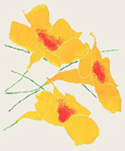











|
|
The Arbor
A Notable Experiment
by Kevin Roddy
 The Arbor is a location, Room 174 AOB IV to be exact, but more precisely it is a notable experiment in the role that technology can play in instruction. And like all experiments, it runs a risk of failure.
A Real Challenge
Similar facilities have been developed at institutions all over the country, and each has had to resolve a number of difficult issues relating to technology and teaching. Technology offers many solutions to instruction that seem to undermine the very personal and very human approach that exemplifies the best teaching. Since teaching is also difficult to evaluate objectively, the addition of a technological component further complicates the process. Some students' responses may be skewed to the positive simply because the experience has been new and different. Others may feel that technology mechanizes their classroom environment. Another difficulty is the role of teaching at a major research university.
No matter how extensive the local efforts are (and the University of California, Davis, is reckoned one of the best teaching universities in the country) there is a pronounced emphasis on research, which must necessarily limit the resources dedicated to teaching. No wonder, then, that a number of institutions have already had to scale back on their plans for such facilities.
Faculty Oversight Committee
From the outset, the Arbor was planned to take advantage of the strengths at UC Davis, and at the same time avoid -- or at least lessen -- these difficulties. While Information Technology supports the Arbor, it is directed entirely by a Faculty Oversight Committee. The twelve faculty who have been selected and have volunteered for this committee are some of the best instructors UC Davis has to offer: among them are winners of the Excellence in Teaching Award in the Academic Federation, and the Academic Senate's Distinguished Teaching Award; they all have spent an enormous share of their lives engaged in innovative teaching, solid research, and public service. They became accomplished in teaching and technology precisely because they have been dedicated to improving their own instruction. Moreover, they have volunteered in their departments, divisions, and colleges to help others learn these skills. Most participate in the successful Summer Institute on Technology in Teaching, a four-year-old venture created by the Teaching Resources Center and by Information Technology to provide a week-long intensive experience of technology in and beyond the classroom. By any reckoning, the Arbor's Oversight Committee represents as powerful an array of talent, experience, and commitment as exists on this campus. But there is still a risk, arising from the uncertainty associated with technology itself: there are too many variables, too many changes occurring too rapidly, too much hype, too many false leads, and too much early obsolescence.
Addressing Challenges
The Arbor Oversight Committee and staff have worked to meet these challenges. The use of a fa-culty board is in itself uncommon, though not unprecedented at Davis. A committee of peers means that we can come to a consensus that is far more persuasive and efficient than a single all-encompassing directive might be. The Arbor staff and faculty are fully prepared to advise against the use of technology in any particular instance, working from an assumption that technology should be appropriate in order to be effective. To address the challenge of evaluation, the Arbor has hired Susan O'Hara, a graduate student in the Division of Education, to work and consult with faculty on questions of teaching evaluations as well as on assessment of the use of technology in instruction.
The Arbor is a sign of hope in a struggle to encourage the thoughtful and innovative use of technology in teaching. It is immersed in the dynamics of challenge, seeking to reproduce and extend the achievement of the Summer Institute by relying on master and mentor teachers. The Arbor must accomplish this year-round, in a sustainable and dependable way. It must adapt and yet not be caught in unreliable technology. It must commit itself to that most difficult of institutional endeavors, consistent communication without constant noise, information without hyperbole. The Arbor must above all be dedicated to serving as ably as possible all the faculty of the University.
Kevin Roddy is the director of the Arbor and a lecturer in Medieval Studies.
|

 Information Technology News of the University of California, Davis
Information Technology News of the University of California, Davis  October 1997
October 1997

 Information Technology News of the University of California, Davis
Information Technology News of the University of California, Davis  October 1997
October 1997